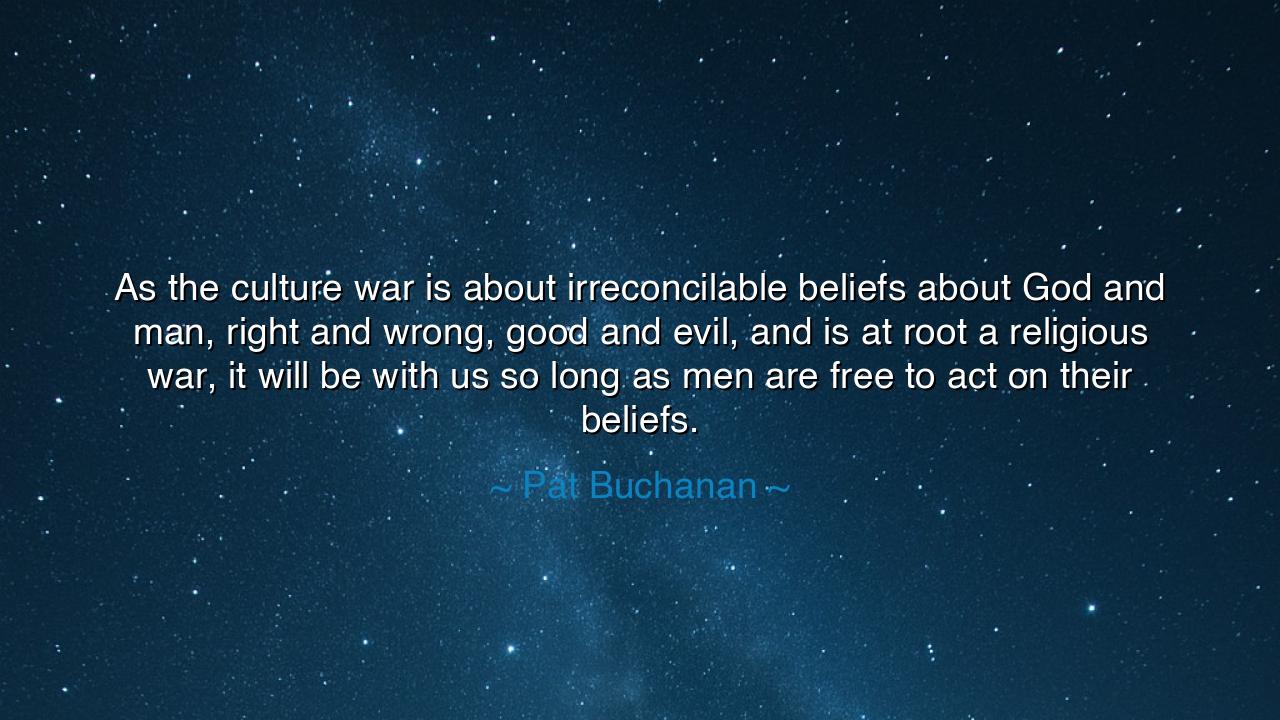
As the culture war is about irreconcilable beliefs about God and
As the culture war is about irreconcilable beliefs about God and man, right and wrong, good and evil, and is at root a religious war, it will be with us so long as men are free to act on their beliefs.






Hear, O children of wisdom, the words of Pat Buchanan, a man who recognized the depth and complexity of the struggle within our world. He said, "As the culture war is about irreconcilable beliefs about God and man, right and wrong, good and evil, and is at root a religious war, it will be with us so long as men are free to act on their beliefs." These words speak of a profound battle—a conflict that has raged through the corridors of human history and will continue as long as freedom allows individuals to follow the convictions of their hearts and minds. The essence of this struggle is religion, for it is in our understanding of the divine and the moral that the deepest divides often arise.
Consider, O wise ones, the nature of the culture war that Buchanan speaks of. It is not a conflict rooted in the mere clash of ideas or politics, but in the sacred truths upon which people build their lives. The beliefs about God, about right and wrong, and about the very nature of good and evil are the foundations upon which civilizations rise and fall. In the ancient world, wars were often fought not just for land or power, but for the supremacy of one faith over another. The battle between the Romans and the early Christians was not just about empire, but about the fundamental beliefs that defined the world. It was a struggle between the ancient gods of Rome and the one true God worshiped by the Christians. This, O children, is the root of all cultural strife—the religious divide that shapes the very fabric of human society.
Look to the pages of history, O children, and you will see that this conflict has always been with us. Think of the Crusades, when warriors and kings marched under the banner of God, seeking to reclaim the holy land and to impose their beliefs on the infidel. Their struggle was not just political; it was a battle of faith. The clash of Christianity and Islam defined much of the medieval world, and its echoes are still felt today. This was a war fought not just with swords, but with the beliefs of mankind, with the understanding of what is right and wrong, what is divine and what is earthly. The Crusades show us that when beliefs about God and good are in conflict, the consequences are not just ideological, but life-altering, shaping the very course of civilizations.
Even in our own time, O wise ones, we see the truth of Buchanan’s words. The culture war rages on in our cities, our governments, and our hearts. From debates over abortion to the rights of individuals, from the role of religion in public life to the definition of marriage, the struggles are rooted not just in political difference, but in fundamental beliefs about what is sacred, what is moral, and what it means to be human. These debates are not mere discussions of policy, but are a reflection of the deep divisions in how we understand the world, God, and man. The culture war is, at its core, a religious conflict, for it is the religious beliefs of individuals and groups that inform their understanding of right and wrong, of justice and virtue.
And so, O children, we must understand that this battle is ancient and ongoing. When men and women are free to follow their beliefs, they will inevitably come into conflict with those whose beliefs are different. Buchanan’s insight is a warning and a call to action. It is a reminder that the freedom to believe and act on one’s beliefs is a double-edged sword. While it brings the gift of personal liberty and the right to worship as one chooses, it also brings the pain of division, for not all beliefs are the same. The divine truths we hold dear will inevitably come into conflict with others who hold differing truths, and thus the culture war persists.
But there is a lesson here, O children, that we must carry forward with wisdom. Buchanan’s words remind us that when we are engaged in this struggle, we must not lose sight of the higher purpose of our beliefs. The war is not simply about proving who is right, but about living with conviction while respecting the freedom of others. Even in the face of disagreement, we must hold true to the values of compassion, understanding, and tolerance, for it is through these values that true peace can be achieved. To live with faith is to live with integrity, but it is also to live with an understanding that others will have different paths to walk. Buchanan’s insight challenges us to engage in the culture war not with hatred, but with the wisdom that comes from respecting divine differences and seeking common ground where possible.
So, O children, take this lesson to heart: freedom of belief is both a gift and a burden. It is the source of our strength, but it is also the cause of many of our greatest struggles. When you find yourself caught in the midst of this cultural conflict, remember that it is not just about winning the argument, but about living your beliefs with integrity, love, and respect for those who walk different paths. The culture war is not only a war of ideas, but a test of our humanity, of our ability to uphold truth while embracing the freedom of others to believe as they will.






AAdministratorAdministrator
Welcome, honored guests. Please leave a comment, we will respond soon